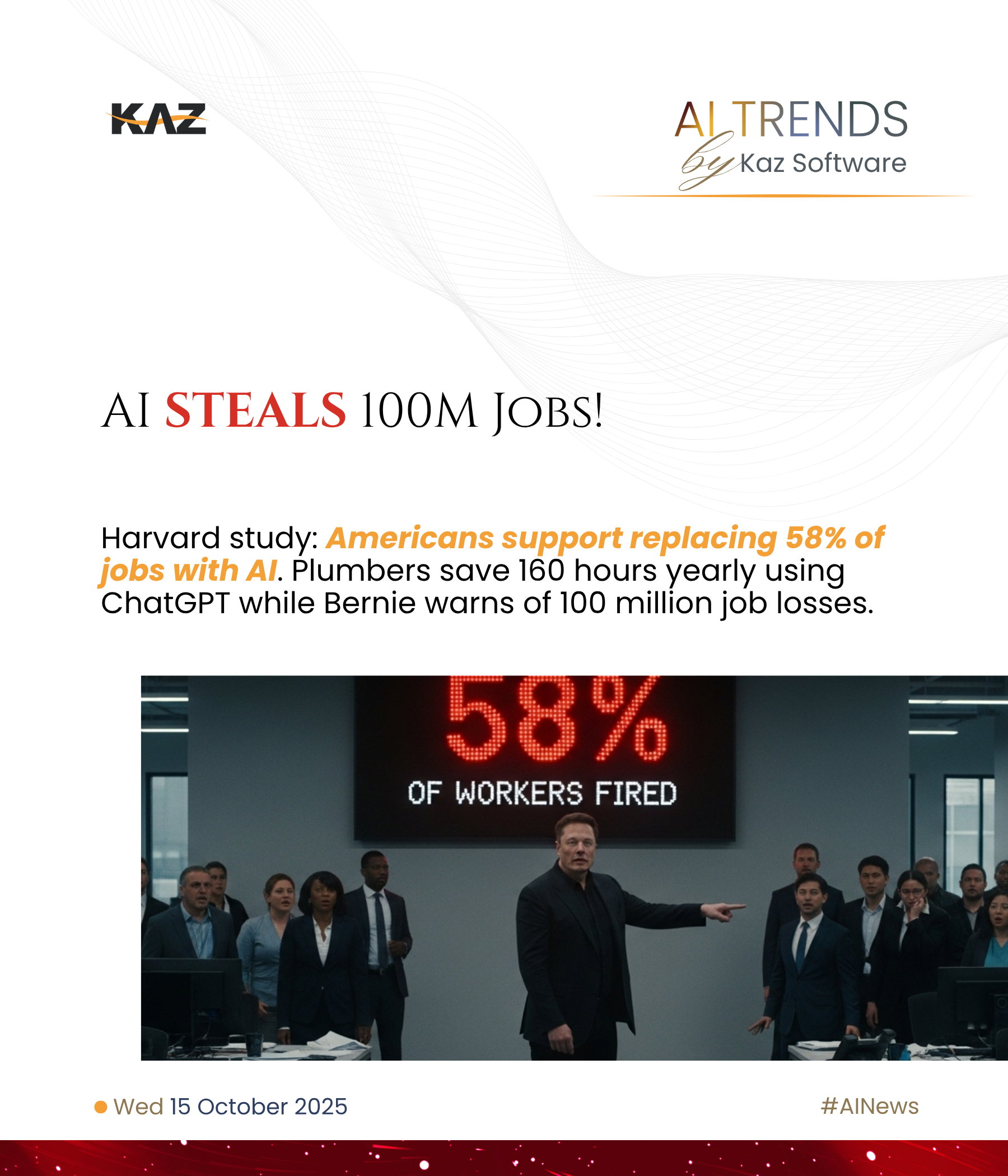Americans want AI to replace 58% of jobs
/BREAKING: Americans support automating 58% of jobs when AI is cheaper/better. Therapists "morally protected" but plumbers already saving 160hrs/year with ChatGPT. Bernie: 100M jobs gone.
Americans are shockingly eager to hand over most jobs to robots—except when it comes to therapy, caregiving, and spiritual guidance. A new Harvard study found that 58% of occupations get the green light for automation when AI proves cheaper and better than humans. Meanwhile, plumbers are already using ChatGPT to save 160 hours a year while Bernie Sanders screams about 100 million jobs vanishing. The reality is far weirder than anyone predicted.
The jobs Americans desperately want robots to steal
Harvard researchers discovered Americans have zero moral objections to automating 30% of jobs right now with current AI capabilities. When told AI could do the work better and cheaper, that support skyrockets to 58% of all occupations. The message is brutal: for most jobs, human workers are just expensive inefficiencies waiting to be optimized away. The resistance isn't philosophical—it's purely about whether the robot can do the job well enough.
The "no friction" zone where both capability and public acceptance align includes search market strategists, financial analysts, economists, and special effects artists. Nobody cares if these white-collar workers get replaced because the public sees these jobs as pure information processing with no essential human element. The blue "technical friction" zone reveals opportunities where moral permission exists but technology hasn't caught up: semiconductor technicians, cashiers, mail sorters, gambling dealers. These are jobs Americans would happily hand to robots if only the robots were competent enough.
The Stanford Digital Economy Lab compared this to what workers themselves want automated, creating a fascinating disconnect. Workers desperately want AI to handle scheduling, payroll errors, database maintenance, and standardized reporting—the soul-crushing administrative tasks that make people hate their jobs. But there's a massive gap in areas like film editing and graphic design where workers understand the craft distinction between great and mediocre work, while the public just sees tasks to complete. The public essentially says "why should we care about your artistic integrity when a robot could do it cheaper?"
Why plumbers love AI but therapists should panic
The moral repugnance line is absolute for 12% of occupations: caregivers, therapists, spiritual leaders, OBGYNs, school psychologists. These jobs trigger visceral rejection of automation regardless of capability. Harvard researchers called it "categorically off limits" and "morally repugnant." The public draws a hard boundary around human connection and care that no amount of technological advancement can cross.
Yet the workers in these "protected" fields tell a completely different story. Caregivers actively want AI to automate intake summaries and administrative work because they're drowning in paperwork while trying to provide actual care. One commenter noted the reality: "No more elder neglect while warehoused in care homes administered by underpaid overworked staff." The moral outrage from outsiders ignores that many care facilities are already failing their human mandate due to crushing workloads and burnout. AI could free caregivers to actually care instead of filling out forms.
The surprise winner in AI adoption? Blue-collar trades. House Call Pro's survey of 400 home service professionals found 40% actively using AI, with cleaning professionals leading adoption and electricians most satisfied. Oak Creek Plumbing has all 20 plumbers using ChatGPT for troubleshooting. Gulf Shore Air Conditioning implemented full AI booking systems and diagnostic tools, replacing hours of manual searching with instant technical answers. These trades require massive technical knowledge libraries that AI makes instantly accessible. A plumber with ChatGPT becomes a plumber with every manual ever written at their fingertips. They're saving 3.2 hours weekly—160 hours yearly—on administrative tasks they hate while getting better at the hands-on work they love.
Bernie's 100 million job apocalypse meets reality
Senator Sanders' new report claims AI will eliminate 100 million US jobs in the next decade, including 89% of fast food workers, 64% of accountants, and 47% of truck drivers. The methodology? They literally asked ChatGPT how many jobs it would destroy, and ChatGPT obligingly provided apocalyptic numbers. Senate staffers acknowledged this approach was "questionable" but argued it represents "one potential future in which corporations aggressively push forward with artificial labor."
Sanders writes that AI will have a "profoundly dehumanizing impact" and demands a 32-hour work week, $17 minimum wage, and elimination of tax breaks for automating companies. His op-ed argues we need "a world where people live healthier, happier, and more fulfilling lives" rather than just efficiency. The fascinating part isn't his solutions but his premise: he fully accepts AI is here and transformative, skipping the denial phase entirely to jump straight to negotiating the new social contract.
The reality on the ground contradicts both the apocalypse narrative and the techno-optimist fantasy. Those blue-collar companies using AI aren't firing anyone despite massive time savings—73% report no impact on hiring rates. Crystal Lander from Gulf Shore Air Conditioning says their technicians are "running more efficiently and less stressed," calling herself "a real-life Jetson living in the future." The pattern emerging isn't mass unemployment but rather workers doing less administrative drudgery and more actual work. AI eliminates the parts of jobs people hate while amplifying the parts that require human judgment, creativity, and physical presence.
The agricultural revolution took thousands of years, the industrial revolution over a century. Sanders warns artificial labor could reshape everything in under a decade. He's probably right about the timeline but wrong about the outcome. The studies show Americans are surprisingly comfortable with most automation as long as it works, desperately protective of human care roles, and already adapting in unexpected ways. Plumbers with AI aren't unemployed—they're superplumbers. The question isn't whether AI will transform work but whether we'll let moral panic or actual evidence guide our response.





